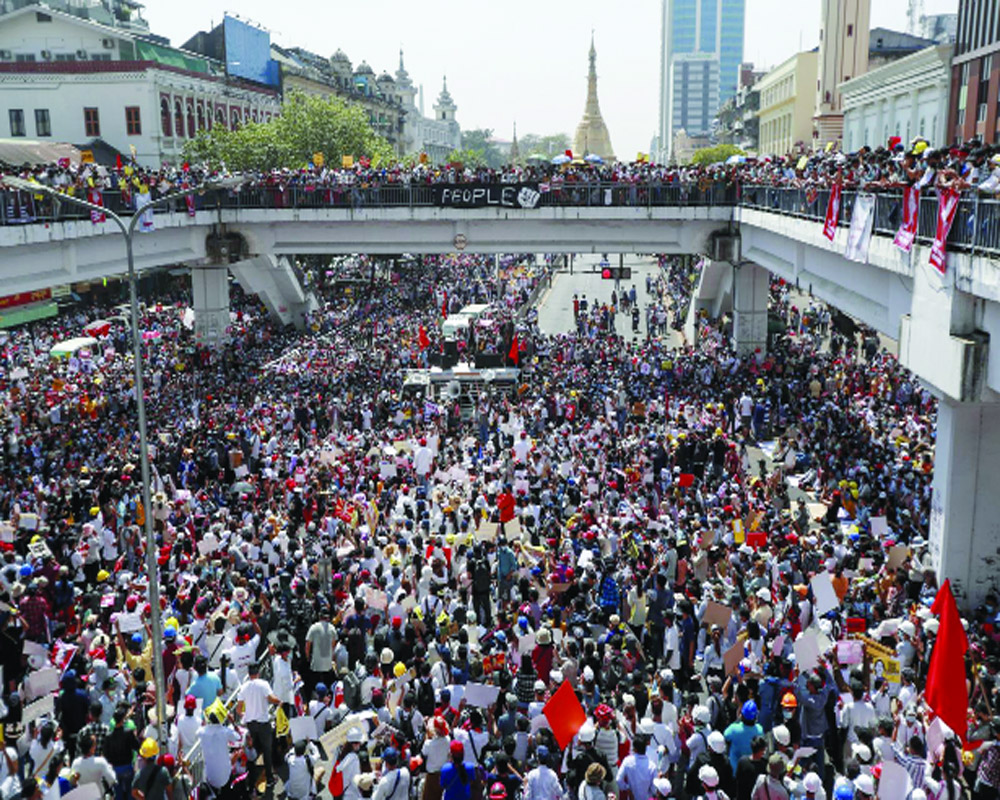India must choose who to take sides with in Myanmar, it cannot afford to go wrong as it did in Nepal
India has made much of its ‘strategic independence’ when it comes to diplomacy in recent times, especially with its recent position in Ukraine. India clarifies that it will not be taking binary choices amongst conflicting ‘blocs’ anymore, but one which weighs the situation on every matter and then decides the best for India’s interest. The external Affairs minister insisted, “Indian foreign policy is there to serve the Indian people; we will do whatever it takes to discharge that responsibility”. While the verdict on the same is still out there in terms of its efficacy vis-à-vis relationship with its most important neighbours i.e., China, Pakistan, and Nepal — it is now the equation with restive Myanmar, with whom it shares a 1643 kilometers long border that is confounding.
India’s schizophrenic relationship with Myanmar has historically been conflicted and yo-yo-ing for three reasons. Firstly, India’s natural preference is to bat for democracy as opposed to Junta or Tatmadaw (‘Grand Army’ as the Military of Myanmar is called). Secondly, the perennial threat of the Chinese making strategic inroads and overtures, irrespective of the dispensation in power at Naypyidaw. Thirdly, the presence of various India-facing militant camps across the long Indo-Myanmar border. With the longish Military rule in Myanmar from 1962 to 2011 and then with the return of the Junta in the 2021 coup d’état, Delhi has been forced to nuance its idealism for democracy with the practicality of dealing with the Junta-led Myanmar.
Additionally, the brief civilian rein from 2011 to 2021 of the Aung San Suu Kyi-led National League for Democracy (NLD) was also not as overtly ‘pro-India’ as was initially imagined, given Delhi’s historic support to democracy in Myanmar and owing to the sanctuary offered to Aung San Suu Kyi personally, when in exile. Like Junta leadership earlier, Aung San Suu Kyi too made several dashes to Beijing and strove to push the China-Myanmar Economic Corridor (CMEC), to Delhi’s discomfiture.
Factually, it was Tatmadaw’s behind-the-scenes facilitation that had enabled Indian troops to conduct ‘Operation Hot Pursuit’ against insurgent camps in Myanmar. Practically, there wasn’t much difference between Military rule or Civilian rule, as far as India was concerned — fears of an ensnaring China always loomed, irrespective of the government.
When the internal power struggle led to the return of Tatmadaw in 2021, Delhi instinctively raised all the moral concerns about the imminent loss of democracy et al, but Beijing had remained decidedly silent and virtually supported the Junta. Huge local protests and a rapidly growing popular resistance movement (with various Ethnic Armed Organisations) notwithstanding, it has been over two years since the Junta take over, and the Junta is not in the mood to secede any space for democracy, anytime soon.
Delhi soon recalibrated its purported stance and was seen to be unusually accommodative of the Junta reality – prospects of a default Chinese takeover with the ‘Dragon’ singularly championing the Junta perspective by vetoing damaging resolutions in the United Nations and other disablements was too alarming for India. Already civilians fleeing the Chin State of Myanmar into camps in Mizoram have led to complicated dynamics not only within India but also with Delhi’s equation with Junta.
Walking a tightrope, Delhi seems to have finally punted on normalising engagement with the Junta with a degree of unprecedented openness. Portents of its diplomatic ‘strategic independence’ have led to actions that run contrary to ‘Free World’ sensibilities and public sanctioning – but more pertinently, it also makes India look much like China in the wary eyes of even the majority Bamar civilians, from whom all previous regimes drew legitimacy.
Engagement with Junta will come with the loss of public goodwill and already the foreign minister of the parallel National Unity Government (NUG) acknowledged that India is not supporting the pro-democracy movement, as it was expected to.
While Delhi is caught between the devil and the deep sea in terms of either supporting the pro-democracy movement or legitimizing the Junta, it all depends on reading who Delhi believes will hold sway at Naypyidaw, ultimately. It simply cannot afford to go wrong in reading the proverbial tea leaves, as it did in Nepal. Despite increasing violence in the ensuing civil war, the exodus of foreign investments and popular unrest brewing, Delhi seems to have taken an unusual position under its muscular ‘strategic independence’ template and awaits to see how it plays out.
Perhaps previous ‘strategic ambiguity’ may have been more prudent by continuing to make all the politically correct noises about democracy, whilst engaging with Junta at a practical and under-the-radar level, as could have been acceptable to the desperate Junta, who unlike democratic governments crave no international legitimacy, beyond a point. Junta also presumably has unstated alignment with Delhi on its hard stance on the Rohingya issue, which along with its selfish quest to have quiet borders along India (to curb gunrunning of insurgent groups) may have played well along the option of ‘strategic ambiguity’.
However, Delhi has chosen to be more brazen and explicit in punting on the Junta as the force that will prevail in the long-term in Myanmar, the current civil war, exodus and flight of capital, notwithstanding. Will Delhi get it right or will the dice roll the way they did in Nepal, only time will tell?
(The writer, a military veteran, is a former Lt Governor of Andaman & Nicobar Islands and Puducherry. The views expressed are personal)


























